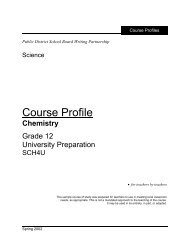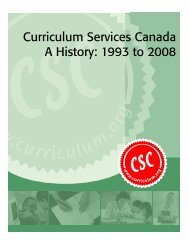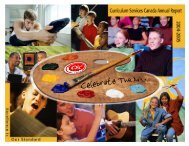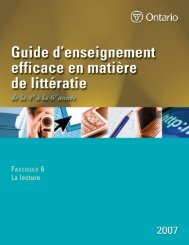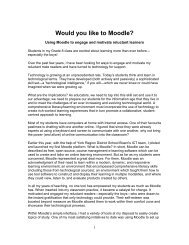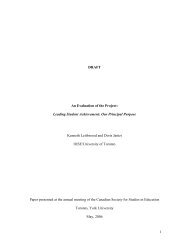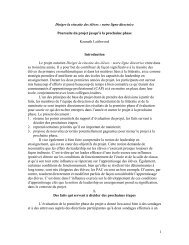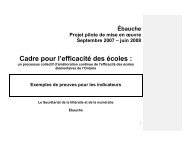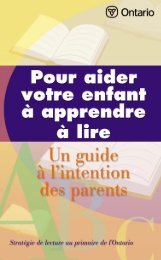Course Profile - Curriculum Services Canada
Course Profile - Curriculum Services Canada
Course Profile - Curriculum Services Canada
You also want an ePaper? Increase the reach of your titles
YUMPU automatically turns print PDFs into web optimized ePapers that Google loves.
Prior Knowledge Required<br />
• Depending on the ISP option selected, ensure that students have been introduced to the necessary<br />
skills and literary terms to complete the assignment.<br />
Planning Notes<br />
• The ISP for the Grade 9 academic course can take a variety of forms. The key components which<br />
must be present for any ISP would be process work, research, written report or essay, an oral<br />
presentation, and a creative component. Possible options for an ISP would be:<br />
• A research report based on a theme/topic inspired by course work, e.g., adolescent alienation,<br />
teen suicide, nuclear war, racism, gangs, the environment, and family conflicts.<br />
• A independent novel study, where the student would not only write a literary analysis of the novel,<br />
but also a biographical study of the author and “book talk” about the text.<br />
• An author study, where the student profiles several works and themes by a particular author.<br />
• A scrapbook of reading responses on a particular theme, which would include reading one noncourse<br />
novel, two non-fiction articles and two poems on a selected theme. Students could also<br />
provide response journals, answers to analysis questions, research the novel author, and complete<br />
creative extension(s).<br />
• The creative component should be presented in combination with the oral presentation. Possible<br />
suggestions for creative extensions within the ISP framework include: a painting or sculpture reflecting<br />
the theme under study, a short story or alternate ending based on the novel read, a newspaper or<br />
magazine focusing on the topics/themes of the independent readings, a 3-D model of the setting for the<br />
novel read, designing a game, creating a video or radio play based on the readings, a sound or visual<br />
collage, to name only a few options.<br />
• The teacher should conference with the teacher/librarian to arrange time in the library/resource centre<br />
for the research component. If the ISP is introduced early in the term, this would provide an ideal<br />
opportunity for an orientation to the library and its various services.<br />
• The ISP is intended to be a project that the students work on over the length of the course. Therefore<br />
it should be introduced early in the term and students should be afforded time to conference with the<br />
teacher and show proof of process work as the term progresses. Final written work and presentations<br />
would take place towards the end of term.<br />
Teaching/Learning Strategies<br />
• Outline the expectations of the assignment, being sure to conference with students about the<br />
timeline/due dates for all components of the process and product.<br />
• The steps in the process are:<br />
• Submit a proposal, which could include a topic, a theme, an author and/or proposed readings.<br />
• Complete the required reading.<br />
• Visit the library/resource centre and complete required research.<br />
• Draft the major paper.<br />
• Conference with peers, revising and editing work as required.<br />
• Submit written work, including the major paper and work/response journals, (a minimum of four<br />
over the course of the term, i.e., one per month).<br />
• Deliver an oral presentation for the whole class, approximately ten minutes in length.<br />
• Share the creative component, likely in conjunction with the oral presentation.<br />
Unit 6 - Page 9<br />
•English - Academic



